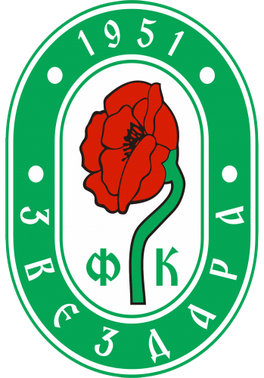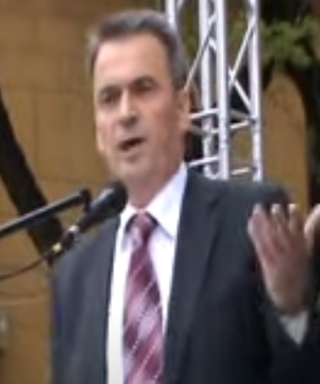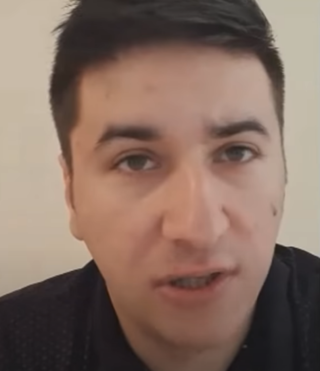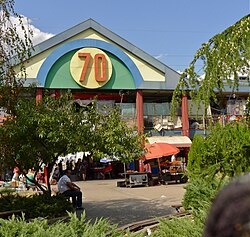Branislav Ivković, known as Bane, is a Serbian engineer, academic, and former politician. He was a cabinet minister in the government of Serbia from 1994 to 2000 and served in the parliaments of Serbia, the Federal Republic of Yugoslavia, and Serbia and Montenegro. At one time a prominent figure in the Socialist Party of Serbia, he led the breakaway Socialist People's Party in the early 2000s.

Demographic features of the population of Serbia include vital statistics, ethnicity, religious affiliations, education level, health of the populace, and other aspects of the population.

The Social Democratic Union was a minor social democratic and leftist political party in Serbia. In 2020 Party merged into Party of the Radical Left.

Zoran Žižić was a Yugoslav and Montenegrin politician. He served as Deputy Prime Minister of Montenegro in the first two Đukanović cabinets from 1991 to 1996, and was the first Prime Minister of the Federal Republic of Yugoslavia following the overthrow of Slobodan Milošević in 2000.

FK Zvezdara is a football club based in Zvezdara, Belgrade, Serbia. They compete in the Serbian League Belgrade, the third tier of the national league system.
Local elections were held in Serbia over two rounds on 3 November and 17 November 1996, concurrently with the 1996 Vojvodina provincial election; the first day of voting also coincided with the 1996 Yugoslavian parliamentary election and the 1996 Montenegrin parliamentary election. This was the third local electoral cycle held while Serbia was a member of the Federal Republic of Yugoslavia and the last time that Serbia oversaw local elections throughout Kosovo and Metohija until its parallel elections in 2008.

Radoslav (Lale) Pavlović is a Serbian writer. Pavlovic authored numerous theatre plays and film/TV scripts popular with the audience and acclaimed by the critics. He is best known for his theatre plays Šovinistička farsa, performed more than a thousand times across ex-Yugoslavia, Mala, and Moja Draga performed for hundreds of times in Belgrade theaters, as well as movies Balkan Rules (1997), Living like the rest of us (1983), Hajde da se volimo 3 (1990) featuring ex-Yugoslavia mega-star Lepa Brena, and TV series Moj Rodjak sa Sela (2008) scoring record viewership of over 3 million viewers per episode.

Milorad Mirčić is a Serbian politician. He is a prominent figure in the far-right Serbian Radical Party and has served several terms as an elected official at the local, provincial, and republic levels. Mirčić was the mayor of Novi Sad from 1993 to 1994 and was minister of the Serb diaspora in the Serbian government from 1998 to 2000. He is now a member of the Novi Sad city assembly.

Vladislav Dajković is a Montenegrin Serb politician serving as a member of the City Assembly of Podgorica since 12 April 2023. He was one of the founders and former secretary general of the True Montenegro, a right-wing populist pro-Serbian political party in Montenegro, which he left in 2019, after which he founded another right-wing party, Free Montenegro.

Muhamed Hamdi Jusufspahić is a Serbian Islamic cleric and diplomat serving as the Ambassador of Serbia to Saudi Arabia since 2018. Previously he was the Mufti of Serbia, Mufti of Belgrade and the Deputy Grand Mufti of Serbia.
Dragan Milošević is a doctor, politician, and administrator in Serbia. He served in the Assembly of Vojvodina from 2000 to 2004 and has been a member of the Novi Sad city assembly. During his time as an elected official, Milošević was a member of the Democratic Party.
Local elections were held in Serbia on 24 September 2000, concurrently with the first round of voting in the 2000 Yugoslavian general election and the 2000 Vojvodina provincial election. This was the fourth and final local electoral cycle to take place while Serbia was a member of the Federal Republic of Yugoslavia.
Branislav Kovačević, also known as Cole, was a playwright, politician, and activist in Serbia. A prominent opponent of Slobodan Milošević's government in the late 1990s, Kovačević was the leader of the League for Šumadija and served in the National Assembly of Serbia from 2001 to 2004.
Radovan Radović, commonly known as Raka, is a retired politician in Serbia. He served several terms in the Serbian and Yugoslavian parliaments between 1991 and 1997 and was the mayor of Trstenik from 2004 to 2008. For many years a member of the Socialist Party of Serbia, he later founded his own Our Home Serbia party and has been a member of the Serbian Progressive Party since 2013.
Dobrivoje Budimirović, commonly known as Bidža, is a retired politician in Serbia. He was the mayor of Svilajnac for most of the period from 1989 to 2008 and also served in the Serbian and Yugoslavian parliaments. For many years a member of the Socialist Party of Serbia, he later started his own political movement and is now a member of the Serbian Progressive Party.
Dragan Milovanović is a Serbian labour union leader and former politician. From 2001 to 2004, he was Serbia's minister of labour and employment. During his political career, Milovanović was the leader of the Association of Free and Independent Trade Unions and the Labour Party of Serbia.
Milan Veselinović is a Serbian politician. He has served in the parliaments of Serbia and the Federal Republic of Yugoslavia, been a deputy minister in the Serbian government, and held high political office at the city level in Novi Pazar. He is a member of the far-right Serbian Radical Party.









